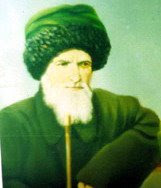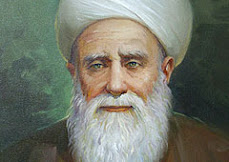
Love of the Prophet PEACE BE UPON HIM
Shaykh Muhammad Hisham Kabbani
Islamic Educational Center, Fremont, January 27, 2003
[Began w/ an Introduction by host Professor Muhammad Ahmad]
Audhu billahi min ash-shaytan ir-rajeem Bismillah ir-rahman ir-raheem
Nawaytul-arba`een, nawaytul 'itikaaf, nawaytul khalwa, nawaytul `uzla, nawaytus salook, nawaytul riyaada lillahi ta`ala al-`adheem fee hadhal masjid.
It is an honor for me to come and listen to the advice, it is not a lecture, an advice from the Professor on the love of Sayyidina Muhammad (s). I really came to listen only. I am not feeling that I have to add anything, because when the love of the Prophet (s) comes, we must all feel burned in that love.
"Ya Sayyidi ya Rasulullah!" Just now I was hearing that in the advice that was being presented by the Professor. On the necessity, Dr. Professor Muhammad Qadri, to love the Prophet (s). There is no need to say professor or doctor, Muhammad Ahmad is enough of an honor. Alhamdulillah.
It is a fakhr to be named after Sayiddina Muhammad (s). We are not Wahabi, happy with the diploma we take from the university. Who cares for that?
I heard that at the beginning, when this gathering first started, there were two people coming and listening. Since then it has been continously improving and now we are seeing hundreds of people here.
That shows you are on the right path. I was in Houston yesterday and I was giving an advice in Ghawth `Adham mosque. And masha-Allah, a lot of people from Tariqat al-Qadiriyya invited me to that big event and you could feel there that same feeling of love for the Prophet (s).
Now to love the Prophet (s) is something that we have to feel in our hearts. If we don't feel it and don't know it and don't learn it and don't practice it, then it is only by the tongue. That is why Shaykh Muhammad Ahmad Qadiri, mentioned a hadith of the Prophet (s), "la yuminu ahadakum hatta akunu ahaba ilaykum min walidihi wa waalihi wa an-naasi ijma`een." That means, "You will not achieve true belief until you love me; you have to love me more than you love your parents, yourself and your children and the whole of humanity."
If we look at ourselves today, if our child is sick and you need to take him to a hospital, your life is disturbed. You cannot sleep one hour, without feeling, "My son" or "My daughter." You keep saying to yourself, "My son," or "My daughter" You have that feeling of taking care of that son or that daughter. That is the simple balance or scale that we can use to look at ourselves with. Is that love to the Prophet like the love of our children in our heart or not? If that does not exist, and I am sure it does not, then we have to improve it.
That is what Shaykh Muhammad Ahmad also mentioned that verse:
"Qul in kuntum tuhiboon Allaha fat-tabi`oonee yuhbibkumullah wa yaghfir lakum dhunubakum."
"Say: 'If ye do love Allah, Follow me: Allah will love you and forgive you your sins: For Allah is Oft-Forgiving, Most Merciful.'" [3:31]
It is not the Prophet (s) who said it - it is Allah who said: "Ya Muhammad, say to them, 'If you love Allah, then follow me, Allah loves you.'" Who is that verse for? For everyone; for the Sahaba. I love the Prophet I hope, and everyone loves the Prophet (s). And the Sahaba loved the Prophet (s). So how am I going to love the Prophet when I need to see him and to follow him? How do I follow him if I don't see his footsteps?
So the Sahaba saw the footsteps of the Prophet (s) and he showed them the reality of how to follow. He took them by the hand and they moved, he was guiding them.
But that verse of the Holy Qur'an is for the whole Ummah, from its beginning to its end. That is giving a hidden meaning here. The Prophet (s) was with the Sahaba to guide them. That means the Prophet's presence must exist at all times for all the people, for mankind to follow.
"Wa`alamu anna feekum Rasulullah."
"Know that the Prophet is within you." [49:7]
He did not say he is "baynakum", "among you", but He swt said, "feekum" - "in you." The Holy Qur'an is delicate in every letter and every sentence. If the Prophet (s) is in us, so then Allah is saying to us here, "where then is he now?"
I was hearing an example of this [taps mike]. Are you hearing this? [yes] Why are you hearing it?
That is a voice. That tapping is creating a voice that has a wavelength and the wavelength moves all around space, throughout the universe, and never dies. Those who know physics, eng., know that. That wavelength is moving through space, so that when I tap, that wave moves through space - if you have a receiver you hear it and if you don't you do not hear it.
We are hearing from billions of years, voices coming from the universe, because we have big receivers, we are hearing some thing and yet we are not able to hear something else, it is impossible. Every voice has to be heard if you have the right equipment, because waves move around the world.
When Sayiddina Muhammad (s) read the Holy Qur'an, that wave is ever-living and it does not end. If you want to take it from a Physics point of view. So if that voice is there, why can we not hear it? Because there is something wrong with our equipment.
There is something wrong. What about the hadith, "ma zaala `abdee yataqaraba ilayya bin-nawaafil hatta uhibah. Fa idha ahbabtahu kuntu sama`ulladhee yasma`u bihi wa basarahulladhee yubsiru bihi, wa yadahulladhee yubtishu bihi wa lisanahulladhee yatakallama bih." "My servant does not cease to approach Me through voluntary worship until I will love him. When I love him, I will become the ears with which he hears, the eyes with which he sees the hand with which he acts and the tongue with which he speaks."
A servant approaches through voluntary worship until I love him, as Shaykh Muhammad Ahmad Mahmoud Qadiri, [add that] said that love of Sayiddina Muhammad is important. The Sahaba, from love of the Prophet, they did listened to the Prophet and said, "Yes, Ya Rasulullah, we accept whatever you said." The munafiqeen (hypocrites) tried to create doubts. But the Sahaba said, "na`m sadaqta ya Rasulullah!" on the night of Ascension. But that love is important. It comes about not through obligations, but He said, "ma zaala `abdee yataqaraba ilayya bi-nawaafil hatta uhibah" - through voluntary worship.
Is that obligation in Qur'an, came in heavens or the Prophet did it himself out of love. Out of love the Prophet (s) did it. The obligations, you have to do, you are forced, if not you go to jahannam. It is an obligation, you cannot reach to love of Allah through it. Voluntary worship, there is a way out of it, because if you don't do it you will still go to paradise. But you will not be in that situation mentioned in that hadith. That means if the servant loves Me through Muhammad, by means of nawafil, voluntary worship, then I will love him, it is a reciprocal relationship. It has to be from you first, because Allah already loves His servant. But you have to put your plug, your wire and make the connection from your side.
Then what happens. The hadith "kuntu sama`ulladhee yasma`u bih" That means, "I will give him a special receiver to hear, that he will hear only what that wali can hear." I am going to give him what people cannot hear? What can people not hear? You cannot hear, he cannot hear, . you will hear the voice that people cannot hear because they don't have that opening in their ears. He will give you from that attribute as-Sam`ee, as Sariya heard Sayyidina `Umar's voice from Sham. "O Sariya! Keep to the mountain," from Madina to Sham.1
Sariya was able to hear. Sayyidina `Umar (r) was able to hear and to see. So Sariya has an audio voice only. Sayyidina Umar has video and audio. That is technology from 1400 years ago, since the time of the Prophet (s). Then the hadith continues, "I will give him sight that he can see with, I will be the eyes which he can see with." At that time you have audio, video and TV. Then you can see the Prophet (s) - how he is moving, how he is speaking, how he is acting, and then you can follow. If you cannot see that, then follow those who can. Not everyone can do that, only a few can do that, only awliya can do that, like Sayyidina Abdul Qadir Jilani.
Even though you mentioned Ibn Taymiyya, I don't like to mention him except to show the Wahabis that your "master" was a slave at the door of Sayyidina Abdul Qadir al-Jilani, and he praised him in the book Fatawa ibn Taymiyya.
Then you have audio, video, and that gives us the meaning that the prophet is always present, looking at you and seeing what you are doing. And if you are clever you will be able to see it. And if you are not, then follow one who is. That is an order in hadith, "in kuntum thalathah, fa-ameeru ahadakum" - "If you are three, make one your leader."
That ameer must not be blind, he must not be an unintellectual person. He must be a person who can see the footsteps of the Prophet (s).
I heard this story from my Shaykh and his father and grandfather are from the Qadiri tariqat. He did a complete seclusion in the maqam of Sayyidina Abdul Qadir Jilani for one whole year.
One lady brought her son to Sayyidina Abdul Qadir Jilani and said, "Ya Sayiddi I know you are the Ghawth, and I know for the sake of the Prophet you give." She was a poor lady and she always attended the suhbat, and she would see all the mureeds, disciples, attending the subhat (advice) and dhikr. And in front of each one was a big chicken and they were eating.
She said to herself, "Alhamdulillah, I am poor and Sayyidina Abdul Qadir is rich in both dunya and akhira. I will give my son to sit there. At least he will eat morning and evening."
She said, "I want my son to be your mureed."
He accepted. He was a very good-sized child. He told one mureed, Muhammad Ahmad, "Send him to the basement and give him the awrad for seclusion. And give him one piece of breads and olives to eat each day."
That lady came after one month and thought her son would be eating chicken. Then she saw the mureeds sitting and eating with perfect manners (adab); eating chicken.
She asked the Shaykh about her son. He said, "He is in basement eating special food." She was happy, as she thought since the mureeds are eating chicken, then probably he was eating beef.
She went down and saw her son - he had become very slim. But he was sitting reciting, and light was emitting from his face.
She came to him and said, "What is this?" He said, "That is what I am eating - a piece of bread." She went to Sayyidina Abdul Qadir Jilani (q), "I brought my son to be with you." As she spoke the Shaykh ordered his mureeds, "Eat." Each ate the chicken in front of him, not the pieces, but the entire chicken, with the bones. Then he said to her, "If you want your son to reach the level to eat the chicken with the bones, then he must go through tarbiyya - training." That tarbiyya is for raising and training the ego, which is the most difficult thing. That is what is needed.
al-Fatiha.
Allahumma salli 'ala Sayyidina Muhammadin nabi al-ummi wa 'ala Alihi wa Sahbihi wa sallim. Jumu`ah Mubarak.
NOTES:
[1] It is reported from Hazrat Ibn `Umar (r) that he said that Hazrat `Umar (r) dispatched an army, making one man called Sariyya (r) leader (amir) over it. It is said that one day Hazrat `Umaar (r) was delivering the Friday sermon. In it he said loudly "Ya Sariyya al-jabal!" "O Sariyya! [towards] the mountain." Then a courier came from the army and said: "O Commander of the Faithful! We were on the verge of being defeated when we heard a voice thrice: "Ya Sariyya al-jabal!" So we moved the back our army near the mountain and Allah Most Holy defeated them." Ibn `Umar (r) says that Hazrat `Umar (r) was told that it was he who was shouting in that voice.
Hazrat Ibn `Umar (r) mentions that his father Hazrat `Umar (r) was delivering a sermon on Friday in the middle of his khutba he shouted, "Ya Sariyya al-jabal!" "O Sariyya! [towards] the mountain," and then he resumed his khutba and said, "He who stole a wolf, he oppressed." (i.e. he who fed and watered the enemy, he committed an act of oppression). So some people look at others (i.e. what is this matter?). Hazrat `Ali (r) said to them "He himself would say (something) about this statement." When the people had finished the prayer, they asked Hazrat `Umar (r). He said, "The idea crossed my mind that the idolaters defeated our brethren and the idolaters would run towards the mountain. So if the Muslims moved towards the mountain, they would have to fight from one side only, if they advanced, they would be destroyed. So those words escaped my mouth about which you say that you heard these words."
After a month came the deliver of good news. He said, "The people of the army heard Hazrat `Umar's (r) voice on that day. We all went towards the mountain and Allah made us victorious."
It says in one tradition that the people said to Hazrat `Ali (r), "Did not you hear Hazrat `Umar that while delivering the sermon from the pulpit he said, "Ya Sariyya al-jabal!"? Hazrat `Ali (r) said, "A thousand pities for you! Leave Hazrat `Umar (r) alone! Whenever he has entered anything, he has surely acquitted himself well.
Both riwayat mentioned in Life of the Companions, by Shaykh Kandhalvi.


















No comments:
Post a Comment